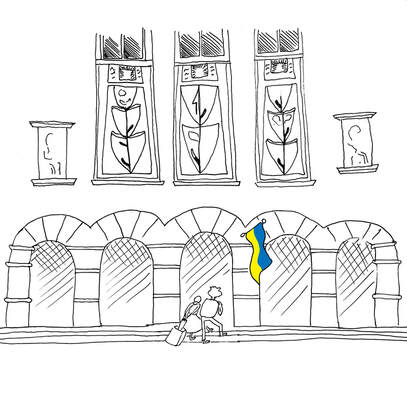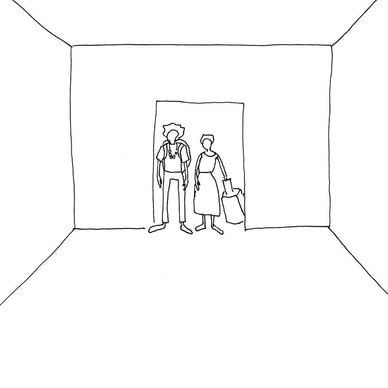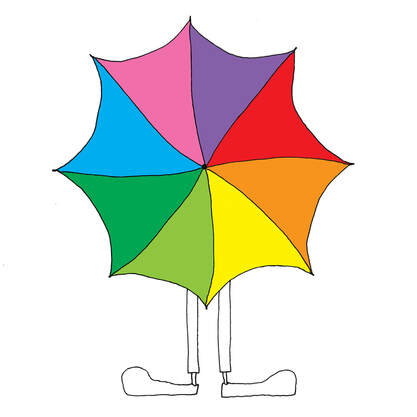|
Text by Igor Narovski & Suzie Ferguson Towering before us, like a cliff, like La Scala opera house, stood The Lviv Academic Puppet Theatre. Above five gigantic arches hung three vast coats of arms that would befit a mediaeval castle. Their designs shifted seamlessly between theatre mask, war shield and back again. In this building's shadow, we ourselves became puppet-like - small and fragile, revived for a moment by the will of the puppeteer, by the will of their hand. In front of the theatre, a long bench stretched across a wide square. On it, we laid our sweat-wet costumes to dry after our hot shift at Lviv Regional Children's hospital. Suddenly, as if from the Gods, a woman dropped into view. “Igor? Suzie?” “Yes,” our puppet heads nodded. “Marichka,” the woman introduced herself. “I’ll show you the room for your masterclass. Just give me a minute, I'm dying for coffee…” While Marichka grabbed her coffee, we rolled up our laundry, packed our dry, sun-smelling clothes, and got ready to follow our guide into the puppet kingdom. And off we went. With each step, the Puppet Theatre advanced as its monumental facade reached skywards. Colossal archways hovered overhead. To the right of the entrance was a poster - not an advert for a performance but a sign leading to a bomb shelter. As the magnificent door to the Puppet Kingdom loomed before us, its wooden handle met Marichka’s hand. She gently pulled it. As if under its own weight, by itself, just waiting for the slight impulse of a human hand, it swung open. The dark, cool hall appeared before us, revealing a solemn marble staircase that led to the finest heights of puppetry. We stepped over the threshold and entered…not the Puppet Theatre, not the salve of its cooling marble, but into the bright, white, studio in Glasgow. We’ve entered the past - two weeks ago, when we were preparing a master class program for Ukrainian clowns… It dawns on us that in going to a war zone to work with clowns who are living through war, who are working with children displaced by that war, we cannot, not address the war. And as this realisation settles in the gut as truth, the question, but how? bursts through the solar plexus. It is starkly obvious that we are not in the same place as these clowns so how do we talk directly about war, coming from our privilege? How do we balance keeping the space emotionally safe while honouring these professionals with the artistic rigour & respect they deserve? How deep do we ask them to go? How much should we provoke? Why is it worth the risk of travelling across a war zone to attend? What if someone is shelled on their way to get to us? We realise that this workshop is an act of mutual aid - professional healthcare clowns with time and resources helping out professional healthcare clowns who are in need. Their need is unique: They are experiencing the same war as the children they visit, the same horror, devastation and fear. How can they be playful, creative and present with this as a backdrop? It occurs to us that we don’t need to invent anything new - we can apply our healthcare clowning practice to this context. Working in hospitals, we know that if our tendency is to run from our own emotions, we will run from other people’s emotions too. Our resulting work will be superficial - we will dodge and distract rather than validate. There is a difference between when someone tries to distract you or fix your situation; ‘It’s raining and i'm cold and wet’ - it’s fine, you’re going to be okay, it’ll stop soon… And when they acknowledge your situation and empower you to feel your own agency; ‘It’s raining and i'm cold and wet’ - yes it’s raining, I see that you are cold. What would you like to do about it? If you avoid your own emotions and needs as a healthcare clown you will find yourself standing in the rain unable to use your umbrella because you haven’t acknowledged that you need it. Accepting the fact that it’s raining and that you are cold and wet means that you can put up the umbrella that you have been holding in your hand the whole time. Only at this point can you invite someone to shelter with you, or help them to put up their own umbrella. Our goal was to help the Ukrainian clowns accept ‘the rain’ and find their ‘umbrellas’. An idea emerges to create a map that guides the group back to 24th February, through their own experience, making sure that they are in a safe enough emotional territory to slow down, feel again and reconnect with themselves. Once re-tethered to this inner-wisdom, we can journey onwards to their work as Healthcare clowns and make the shift from victim, ‘it happened to me’ to clown ‘okay it happened, i've learned from my experience and I’m ready to play with it’’. The shift from ‘I’ve found and opened my umbrella’ to ‘I become someone else’s umbrella’.
1 Comment
|
AuthorI am a therapeutic clown and performer. Writing here is part of my wider practice and maybe some of my thoughts will trigger some thoughts of your own and I hope that helps. Archives
May 2024
Categories |



 RSS Feed
RSS Feed